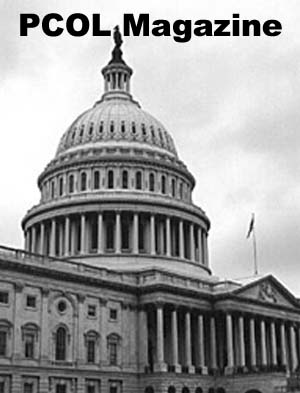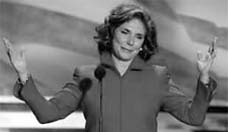
Representative Christopher Cox and the House Policy Committee opposes H.R. 4979
Policy Statement
Supporting the Peace Corps
The Peace Corps’ Mission
in the Islamic World
Thursday, September 19, 2002
“A spirit of sacrifice and service gave birth to the Peace Corps more than 40 years ago. We needed the Peace Corps then, and we need the Peace Corps today.”
President George W. Bush, February 15, 2002
Introduction
In 1961, President Kennedy urged a generation to join “a grand and global alliance…to fight the common enemies of man: tyranny, poverty, disease, and war.” In his State of the Union address on January 29, 2002, President Bush asked the same of this generation when he announced his plan to double the number of Peace Corps volunteers: from 7,000 today, to a near-historic high mark of 14,000 volunteers within five years.
In the wake of the September 11 attacks, President Bush has also tasked the Peace Corps with another vital initiative. The Peace Corps is to expand its programs in Islamic nations, to spread the compassion and goodwill of America, and to promote the values central to democratic nations. The Peace Corps has responded to this request, both by re-entering Islamic countries where the Corps has discontinued its operations, and by expanding existing programs in Islamic nations where Corps volunteers are already present.
Since 1971, the House Policy Committee has supported a strong Peace Corps. On September 21, 1971, the Committee unanimously approved a Policy Statement supporting President Nixon’s plans for the Peace Corps in 1972. The House Policy Committee continues to support the Peace Corps and applauds its efforts to expand its programs to Islamic nations throughout the world.
Reaching Out to Islamic Nations
The Peace Corps has served Islamic countries ever since it was first established. Today, nearly one quarter of all Peace Corps volunteers serve in countries with significant Islamic populations. In Jordan, programs targeting women and children focus on youth and community development, special education, teaching English as a foreign language, development of non-governmental organizations, business development, and information technology. In Morocco, volunteers are working to improve maternal and child health care. They are improving Morocco’s high infant mortality rate by implementing vaccination awareness campaigns, training nurses in appropriate health education approaches and patient counseling, and producing safe birthing kits for pregnant women. Overall, Peace Corps volunteers are serving Muslim populations in 14 countries around the globe.
To fulfill the President’s mandate, the Peace Corps will increase its presence in Islamic countries. The Peace Corps recently re-entered Kyrgyzstan, Uzbekistan, Turkmenistan, and Bangladesh, and plans to re-enter Albania, Azerbaijan, Bosnia-Herzegovina, Chad, and Macedonia in 2003. The Peace Corps is completing assessments of Ethiopia and Sierra Leone for possible 2003 re-entries in both countries.
In the wake of September 11, ensuring the safety of Peace Corps volunteers is paramount. The Peace Corps must balance its expansion into Islamic countries with increased safety and security measures. To do so, the Peace Corps recently established a new safety and security office. In addition, volunteers are being given much more rigorous safety and security training before departing for their destinations.
Legislative Action
Republican Representative Mark Kirk introduced H.R. 5255, “The Peace Corps Expansion Act of 2002,” on July 26, 2002. The bill supports the expansion of the Peace Corps and the President’s request of $317 million for the Peace Corps in 2003. The bill contains no other legislative directives to change the current structure of the Peace Corps.
The alternative minority bill, H.R. 4979, “The Peace Corps Charter for the 21st Century Act,” was introduced by Representative Sam Farr (D-CA) on June 20, 2002. (Senator Chris Dodd (D-CT) introduced a nearly identical companion bill, S. 2667, on June 21, 2002.) H.R. 4979 proposes a Congressional finding that the Peace Corps “should have no relationship with U.S. intelligence agencies.” While intended to quash accusations that the Peace Corps serves as a vehicle for the U.S. intelligence community, this provision would do grave damage to the Peace Corps by legitimizing spurious claims of CIA involvement just as the Peace Corps re-enters countries suspicious of American intentions.
The minority proposal also changes the nature and composition of the Peace Corps’ Advisory Council. The Advisory Council—established by President Reagan in 1984—is currently comprised of 15 Presidentially appointed members, seven of whom are returned Peace Corps volunteers, who advise the President and the Peace Corps Director on initiatives designed to promote the Peace Corps. Under the Dodd/Farr bill, only returned Peace Corps volunteers are eligible to sit on the Council. This would prevent former Peace Corps Directors—such as Labor Secretary Elaine Chao, Mark Gearan (the Peace Corps Director responsible for the Crisis Corps), and even Sargent Shriver, the original director of the Peace Corps selected by President Kennedy—from serving on the Advisory Board.
For these reasons, the House Policy Committee opposes H.R. 4979.
Conclusion
Since it was created in 1961, the Peace Corps has mobilized more than 165,000 volunteers to serve in 135 developing nations. Volunteers—ranging in age from 18 to 82—work at the grassroots level in education, community development, agriculture, health care, and public works. Although each volunteer is given a particular role in a community, the most important job is the simple day-to-day interaction each volunteer has with the people of the villages in which they live.
There is no better symbol of America’s generosity than American volunteers living and working in partnership with the people of developing nations to encourage education and opportunity, and to spread the spirit of sharing that is so fundamental to America’s society. Nowhere is this public diplomacy dimension of the Peace Corps more important than in America’s efforts to reach out to the Islamic peoples of the world. The Policy Committee applauds the efforts of the Bush Administration and of the Peace Corps’ Director, Gaddi Vasquez, to spread America’s message of goodwill throughout the Muslim world.




